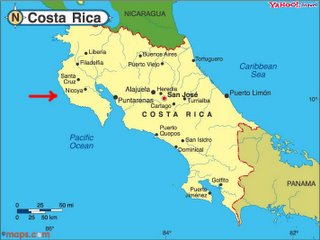 Finally I am in sight of living a personal dream. Ever since the first time I went to Mexico I wanted to go to a language school in a Spanish-speaking country. My professors have always told me that the only way to become truly proficient in speaking Spanish is by studying abroad.
Finally I am in sight of living a personal dream. Ever since the first time I went to Mexico I wanted to go to a language school in a Spanish-speaking country. My professors have always told me that the only way to become truly proficient in speaking Spanish is by studying abroad.I have tried several times to arrange a trip, but either the money wasn't there or I could not arrange it with the university. But recently I got permission from my job and the university agreed to give me credit for the trip. That means I can put the trip on my student aid, which is sort of important. I will be going to Costa Rica, to a town called Nicoya near the Pacific Ocean, (look at the red arrow on the map).
Here's the website for the school:Instituto Guanacasteco de Idiomas
I will be leaving in the middle of July and coming back in the second week of August. Besides the four hours of Spanish classes Monday through Friday, I will be living with a Costa Rican family, and yes, I am going to go to the beach at least once....
 Because the University will be giving me credit, I will have to keep a journal-which I would do anyway. I'm planning on keeping it here-that will keep it safe for the time being. I picked a great time to go,(although it will be hot)-there will be two huge festivals while I am there, a religious one and a week-long patriotic one.
Because the University will be giving me credit, I will have to keep a journal-which I would do anyway. I'm planning on keeping it here-that will keep it safe for the time being. I picked a great time to go,(although it will be hot)-there will be two huge festivals while I am there, a religious one and a week-long patriotic one.
So what are my goals for this trip? Well, besides the obvious one of speaking Spanish better and losing some of my accent there are some other goals. I want to finally feel more at ease around Spanish-speakers. I want to learn those social lessons that can't be learned in a book. I want to get rid of some of those remaining,vague feelings that they are the "other". I know that sounds bad, but if we are honest with ourselves we know thats part of learning language and culture. Truly identifying with a group of people does not come about simply because you can speak their language-there is so much more.
While in some way I wish I could go all around the country and check all of it out-I don't like being a tourist like that, that's the way to get road-ugly and just fill up your camera while only talking to people in restaraunts and hotels. I'm looking forward to being around long enough I can make real friends and really understand this part of Costa Rica.
I've already bought my ticket and my new passport will be here any day-more updates as they become available.
Juanito
Next Costa Rican Entry:Feeling Nervous About the Trip